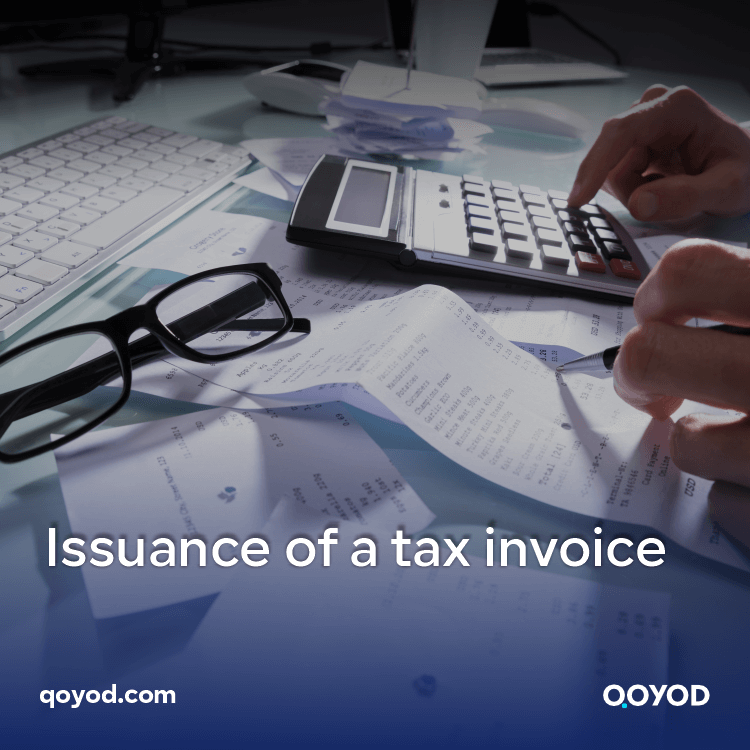In light of the current developments and the tendency of many companies and institutions to complete their work electronically, it has become easy to obtain a tax invoice with the click of a button. There are many electronic invoicing programs that provide the service of issuing a tax invoice with ease, and you only have to be aware of the specific invoicing and tax requirements in your country in which you conduct your business to ensure compliance with your tax invoices and avoid possible penalties or fines.
The concept of a tax invoice
A tax invoice can be simply defined as a document used in financial transactions, especially in the context of the sale of goods or services. A tax invoice is evidence that a trade has occurred and is an important document in countries that implement value-added tax (VAT) or goods and services tax (GST) systems.
Taxes are levied on specific goods and services. Companies need to tax their clients on the products and services they provide, and they need to report such taxes to the government. Therefore, a tax invoice is issued by registered sellers to the buyer, whether an establishment or an individual, so that the invoice contains mainly details of the goods sold and the taxes imposed on them.
The necessity of issuing a tax invoice
The General Authority for Zakat and Income has indicated that all those who are subject to the value-added tax (VAT) provisions are required to issue tax invoices for any supply of goods or services that are subject to taxation, and the Authority specified in the Unified VAT Agreement and the Executive Regulations of the VAT Law some of the necessary elements that must be available in any tax invoice issued.
The issuance of the tax invoice by itself is not sufficient, but it must be ensured that it meets all the conditions specified by the General Authority of Zakat and Tax, so that any lack of uniformly necessary elements in the tax invoice may be considered a tax violation punishable by fines.
There are many forms of potential tax violations, including tax evasion, trying to collect a tax higher or lower than 15%, the absence of a tax number on the invoice, or the failure to issue tax invoices, etc., so all establishments must be keen to use an accounting program to issue tax invoices efficiently and accurately to avoid any possible errors that may occur to them in any type of tax violation.
Tax invoice types
The tax invoice does not differ significantly from the normal invoice in terms of contents; each tax invoice can be considered to be an invoice, but because it contains certain distinctive items, each invoice cannot be considered a tax invoice, and the contents of the tax invoice may vary from place to place according to the established rules.
Different institutions need to issue a tax invoice for many purposes, and there are two types of tax invoices in the Kingdom of Saudi Arabia as determined by the Zakat, Tax, and Customs Authority, namely the tax invoice and the simplified tax invoice, as follows:
Tax invoice
A tax invoice is issued from one enterprise to another and contains all elements of the tax invoice, as follows:
- The address of the tax invoice between an enterprise and an enterprise (at the top of the invoice).
- The serial number of the tax invoice.
- Date and time of issuance of the invoice.
- The invoice has a quick response code. (QR).
- Seller information includes the name and address, the seller’s tax registration number, and any additional knowledge of the seller, such as the commercial registration number.
- Buyer information, including name, address, tax registration number of the buyer, and commercial registration number.
- Information about goods or services, such as name, unit price, subtotal excluding tax, and total inclusive of VAT,.
- Total (excluding VAT).
- Value Added Tax (VAT).
- Total with tax.
Simplified Tax Invoice
A simplified tax invoice is most often issued from an establishment to an individual and contains the main elements of the tax invoice as follows:
- The title is a simplified tax invoice between an establishment and a consumer (located at the top of the invoice).
- Serial number of the tax invoice.
- The date of issuance of the invoice.
- The name and address of the store.
- VAT registration number.
- Information about goods or services, such as their name, quantity, unit price, VAT, and price inclusive of VAT,.
- Total taxable amount.
- Value Added Tax (VAT).
- Total with tax.
- Quick response code (QR).
Why do you need the tax invoice?
The issuance of tax invoices is necessary to establish the sale or supply of goods or services between the seller and the buyer. Since the tax is levied at the time of the sale, all tax taxpayers must issue a tax invoice at the time of the sale or supply, and from the buyer’s point of view, receipt of the tax invoice for the goods or services purchased is necessary to claim the tax refunds.
Moreover, the tax invoice is necessary for the purposes of the various financial reports of enterprises; there is no doubt that tax invoices are necessary in the financial transactions of your enterprise and are necessary for compliance, accounting, and commercial operations. More precisely, it can be said that a tax invoice is issued for one of the following purposes:
Taxes
Tax invoices are used mainly to calculate and report the tax payable by the buyer and seller, and the tax invoice is necessary for value-added tax or goods and services tax systems; the value-added tax is imposed at each stage of production or distribution.
Accounting
Tax invoices are used in account control to record and document details of various transactions, including the amount charged for goods or services sold, the taxes applicable to that amount, and any deductions or modifications in the transaction.
Legal compliance
In many countries, the law requires the issuance of tax invoices in order to support a buyer’s claim for tax refunds, as failure to comply with invoice requirements can result in penalties or fines.
Audit Purposes
Tax authorities require companies to issue a tax invoice and keep accurate records of these invoices, which allows them to verify compliance with tax laws and detect any type of fraud or potential errors, reducing the risk of tax violations and promoting fairness in the tax system.
Commercial operations
Companies track their own sales using tax invoices, control inventory, and manage cash flow as well. Tax invoices also provide a record of goods or services sold and payments received, which the company can use in relation to customer service or the resolution of any disputes concerning its transactions and sales.
How does Qoyod help you issue a tax invoice?
The issuance of a tax invoice has been made easier by the electronic invoicing programs that provide tax invoicing services, notably the Qoyod Special Accounting Program, which will help your company comply with Saudi Arabia’s tax regulations and invoicing requirements by providing a range of outstanding accounting services and solutions.
With the Qoyod cloud accounting program, you can issue electronic tax invoices safely, easily, and quickly. Given that Qoyod is approved by the Zakat, Tax, and Customs Authority, you can be sure that your tax invoices meet all the necessary requirements in Saudi Arabia and contain all the relevant information as defined by the Authority. These are five key elements: the date of issuance or date of establishment of the invoice, the name, address, and tax number of the supplier, and data on goods or services supplied.
Call us today to learn more about all the advantages that Qoyod offers you in streamlining the efficient preparation and issuance of your company’s tax invoice, at any time easily and in a fully secure manner, and to ensure compliance to avoid any possible penalties or fines resulting from errors in the accuracy of your company’s tax invoices.
In conclusion
Tax invoices are essential documents used in the financial transactions of enterprises around the world; they play a crucial role in taxation, accounting, business processes, auditing, and legal compliance. The specific requirements of tax invoices vary from place to place, and it is therefore important that companies in their various areas are aware of their country’s requirements for tax invoices to ensure compliance and avoid penalties or fines.
Many programs are available that provide accounting services to establishments, including issuing tax invoices with ease, and the Qoyod program is one of the most prominent of these programs that will facilitate your company’s financial transactions and make issuing a tax invoice easy that you can complete from your device connected to the Internet. Without downloading, hurry up and activate the Qoyod accounting system to enjoy all the accounting benefits and issue your tax invoices without worry.




